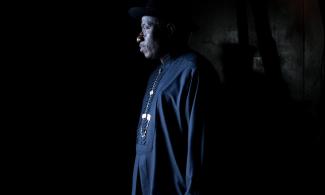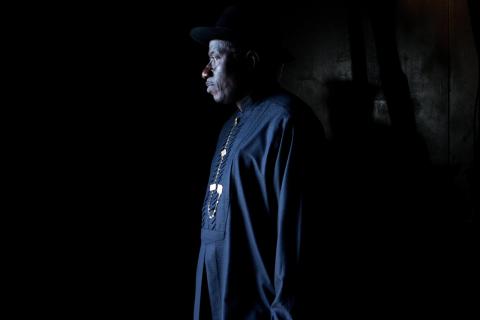
According to several of our sources, the Jonathan administration plans to contend that the task of writing a new constitution should be resolved before Nigeria is subjected to another potentially volatile general elections.
President Goodluck Jonathan of Nigeria is not interested in running for reelection in February 2015. Instead, Mr. Jonathan and his most trusted associates are surreptitiously plotting to build a consensus for a two-year tenure elongation for the president and other public office holders across the country.

SaharaReporters first learned about this presidential design two months ago. Our investigations since then reveal that Mr. Jonathan and his most trusted associates have been working underground to sell the plan to some lawmakers, governors, and political office holders tagged “key stakeholders.”
Our investigation indicates that the president and his trusted allies are still playing the card close to their chests, ensuring that they sound out only those political actors deemed likely to be sympathetic to the plan. One strategy, according to one source, is to seek support from governors who are already in their second and terminal term as well as senators and members of the House of Representatives who may be vulnerable to challenge in an election. Among the political personalities identified as tacitly backing the elongation plan are Senate President David Mark, Governors Martin Elechi of Ebonyi, Emmanuel Uduaghan of Delta, and Segun Mimiko of Ondo, former minister Kema Chikwe, the chairman of the PDP’s board of trustees, Tony Anenih, and Ijaw political figure, Edwin Clark. At various times, both Mr. Mark and Governor Elechi have insinuated that the 2015 elections may not hold, hinting at severe security challenges.
Sources who spoke to us on the plan included several legislators in Abuja and aides to two PDP governors. They disclosed that President Jonathan intends to defend the politically explosive scheme on two grounds.
One is that a general extension of tenure, for a minimum of eighteen months, would be necessary to enable Mr. Jonathan to shepherd the creation of a new constitution. This argument rests on the need for Nigeria to fashion a constitution that incorporates some of the important recommendations of the national confab convoked by President Jonathan and chaired by retired Chief Justice Idris Kutigi.
According to several of our sources, the Jonathan administration plans to contend that the task of writing a new constitution should be resolved before Nigeria is subjected to another potentially volatile general elections.
“We should not see this as a matter of Mr. President trying to stay longer in power. The fact of the matter is that we should address the constitutional issues first before talking about another election,” said a source who is a confidant of Governor Elechi.
The source added that the sheer task of going through the voluminous report submitted by the national confab on August 21, 2014 would require “almost a year of hard work.” According to him, it would be politically suicidal for Nigeria to go through another election and transition on the basis of the current constitution “which most Nigerians are dissatisfied with.” He added: “If elections happen next year and President Jonathan wins, he may no longer feel the need to push for constitutional reforms. If another person wins, then that new president may not make a new constitution a priority. That means that this country will be back to square one. It will also mean that all the efforts we made in the confab would be in vain.”
President Jonathan’s other argument for tenure elongation is that he needs about two years more in office to stabilize Nigeria by finally handling the security crisis posed by Boko Haram. A few sources disclosed that the president intends to make a strong case to potential critics in the US and European Union that the situation in Nigeria’s northeast zone is so dangerous that it would be impossible to hold elections in the area. He would pledge to devote the extra time in office to a decisive plan aimed at dislodging Boko Haram from all parts of Nigeria. Mr. Jonathan is expected to cite the recent string of successes by the Nigerian military against insurgents as proof that he has a formula for defeating Boko Haram.
Nigeria’s political calendar sets aside next February 2015 for the next set of elections, but President Jonathan has not formally declared his intention to run. Our investigations revealed that the president’s silence is deliberate, part of his strategy for pursuing tenure elongation. Mr. Jonathan is reluctant to ratchet up the rhetoric of elections because he wants more time to quietly fine-tune and sell the option of a two-year tenure elongation.
Opponents of any form of tenure elongation contend that President Jonathan wants to avoid an election because he is scared of losing to the opposition. “He has had six years to fix the security problems and also advance a new constitution, but failed,” said an Abuja-based activist. The activist added; “President Jonathan may also be afraid of a possible constitutional crisis. The Nigerian constitution forbids anyone running more than two terms in office. The president has been sworn in twice already, once to complete the tenure of [the] late President Umaru Yar’Adua and then as substantive president in 2011. There is likely to be a legal challenge seeking clarification on whether he can run and possibly rule Nigeria again.”
A source at the Presidency stated that Mr. Jonathan had sounded out some members of national confab about the idea of the body declaring that he should be given extra time to complete a constitutional process, but the response was not encouraging. “Those who were consulted in the confab felt that any talk of elongation would have divided the confab. So they asked us to try alternative ways.” Our investigation also revealed that the Presidency considered the idea of using the Boko Haram insurgency as a pretext to declare a state of war, thereby shelving elections. That plan also fell apart.
Mr. Jonathan’s current approach is to send his associates to approach potentially sympathetic senators and members of the House of Representatives with the proposal of a new constitution as justification for tenure elongation. Our investigation disclosed that the latest approach has met with mixed reactions.
Several senators who spoke anonymously with SaharaReporters disclosed that Mr. Jonathan’s emissaries spoke about postponing the elections for two years in the interest of “Nigeria’s unity.” The sources said legislators who are most likely to lose elections seemed enthusiastic about the prospect of elongation. Two senators also admitted that the president’s associates are likely to win over some legislators because of their ability to offer hefty sums to bribe those willing to support the elongation agenda.
A political adviser to former Vice President Atiku Abubakar said he had heard speculations about extending the tenure, but said he had no independent confirmation of it. However, he stated that Mr. Jonathan must be scared of running in an election in which most northern voters will be against him along with a significant number of southerners voters disenchanted by the president’s non-performance.
He said that Mr. Jonathan’s electoral fortunes would be precarious in all the northern states because of the divisive nature of the president’s governance style.
“Apart from Benue and Plateau states and a section of Southern Kaduna Christians, the president has little chance of campaigning let alone winning in the north,” said one of the critics of tenure elongation.
A strong opposition also looms in the southwest, except in Ondo state where Governor Olusegun Mimiko might help sway voters. But Mr. Mimiko’s electoral boost may have fizzled with the governor’s mismanagement of state resources that has led to the non-payment of workers salaries for at least four months.
Mr. Jonathan will likely win easily in the five eastern states as well as the Niger Delta zone, but votes from the two areas would be insufficient to steer him back to Aso Rock. Besides, the enthusiastic welcome received in Imo State over the weekend by Muhammadu Buhari, a former military head of state and opposition presidential aspirant, suggest that some parts of the southeast may not wholly back Mr. Jonathan.
The president also faces considerable political threat in Rivers State. Governor Rotimi Amaechi’s opposition to Jonathan’s candidacy suggests that the electoral victory figures cannot simply be written.
Several political sources, activists and pundits who spoke to us predicted that Mr. Jonathan’s tenure elongation plan would be doomed in the same way that other such plans, hatched by retired General Ibrahim Babangida, late maximum dictator, Sanni Abacha and former President Olusegun Obasanjo, also collapsed.